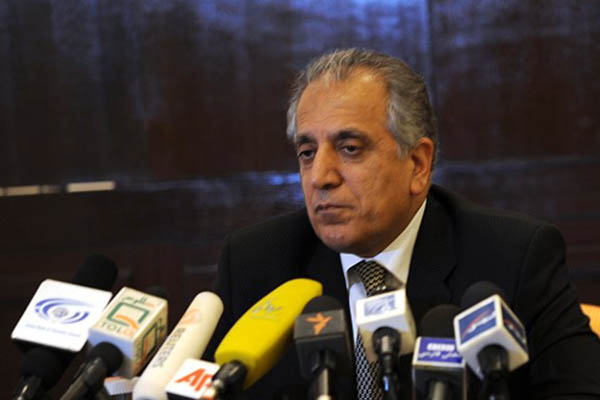
File photo of Zalmay Khalilzad. Massoud Hossaini—AFP
Special envoy claims authorities are negotiating peace, and not withdrawal, agreement
The U.S. and the Taliban met to thrash out elements of a deal to bring a close to Afghanistan’s 18-year conflict at the second day of renewed talks in Doha on Sunday.
The U.S., which invaded Afghanistan and toppled the Taliban in 2001, wants to withdraw thousands of troops and turn the page on its longest ever war. But it would first seek assurances from the insurgents that they will renounce Al Qaeda and stop other militants like the Islamic State group using the country as a haven.
The talks, now in their eighth round, began on Saturday but it was unclear if they would extend into a third day, with neither side commenting on progress by late Sunday. A Taliban source earlier told AFP efforts had been made to organize a direct meeting between U.S. envoy for Afghanistan Zalmay Khalilzad and Taliban co-founder Mullah Baradar, who heads the movement’s political wing. The men have met previously, as recently as May but there was no confirmation of any meeting at this latest round of talks.
A coalition led by Washington ousted the Taliban in late 2001 accusing it of harboring Al Qaeda jihadists who claimed the September 11, 2001, attacks against the U.S. that killed almost 3,000 people. But despite a rapid conclusion to the conventional phase of the war, the Taliban have proved formidable insurgents, bogging down U.S. troops for years.
Washington is hoping to strike a peace deal with the Taliban by Sept. 1—ahead of Afghan polls due the same month, and U.S. presidential elections due in 2020.
U.S. President Donald Trump told reporters at the White House on Friday that “we’ve made a lot of progress. We’re talking.”
“We are pursuing a peace agreement not a withdrawal agreement, a peace agreement that enables withdrawal,” Khalilzad tweeted on Friday as he arrived in Doha after talks with Pakistani Prime Minister Imran Khan in Islamabad. “Our presence in Afghanistan is conditions-based, and any withdrawal will be conditions-based.”
In another sign of progress, the Afghan government has formed a negotiating team for separate peace talks with the Taliban that diplomats hope could be held as early as later this month.
The Washington Post reported on Thursday that an initial deal to end the war would see the U.S. force in Afghanistan reduced to as low as 8,000 from the current level of around 14,000. In exchange, the Taliban would abide by a ceasefire, renounce Al Qaeda, and talk to the Kabul administration.
Secretary of State Mike Pompeo said the U.S. wanted to “reduce the resources” deployed to Afghanistan as he visited Sydney on Sunday.
An Afghan official hinted last week that the government of President Ashraf Ghani was preparing for direct talks with the Taliban, the details of which have yet to be announced. “We have no preconditions to begin talks, but the peace agreement is not without conditions,” Ghani wrote in Pashto on his Facebook page on Friday ahead of the talks. “We want a republic government not an emirate,” he said, a challenge to the Taliban which has insisted on reverting to the “Islamic Emirate” name Afghanistan bore under its rule. “The negotiations will be tough, and the Taliban should know that no Afghan is inferior in religion or courage to them.”
The thorny issues of power sharing with the Taliban, the role of regional powers including Pakistan and India, and the fate of Ghani’s administration also remain unresolved.
The latest U.S.-Taliban encounter follows last month’s talks between influential Afghans and the Taliban, which agreed a “roadmap for peace”—but stopped short of calling for a ceasefire. Kabul resident Somaya Mustafa, 20, said her country desperately needed a peace deal—but only one in which the Taliban “accept women and their achievements.” She added: “It is a total mess in our country right now. And if it continues, women will suffer more than anyone else.”
The United Nations has said that civilian casualty rates across Afghanistan matched record levels last month, following a dip earlier in the year. On Sunday, two people were killed in a blast claimed by the I.S.-linked Khorasan Province group targeting Afghan television staff in Kabul. And in the southern province of Kandahar, at least seven Afghan police officers were killed when a group of colleagues thought to be loyal to the Taliban opened fire, officials said.
